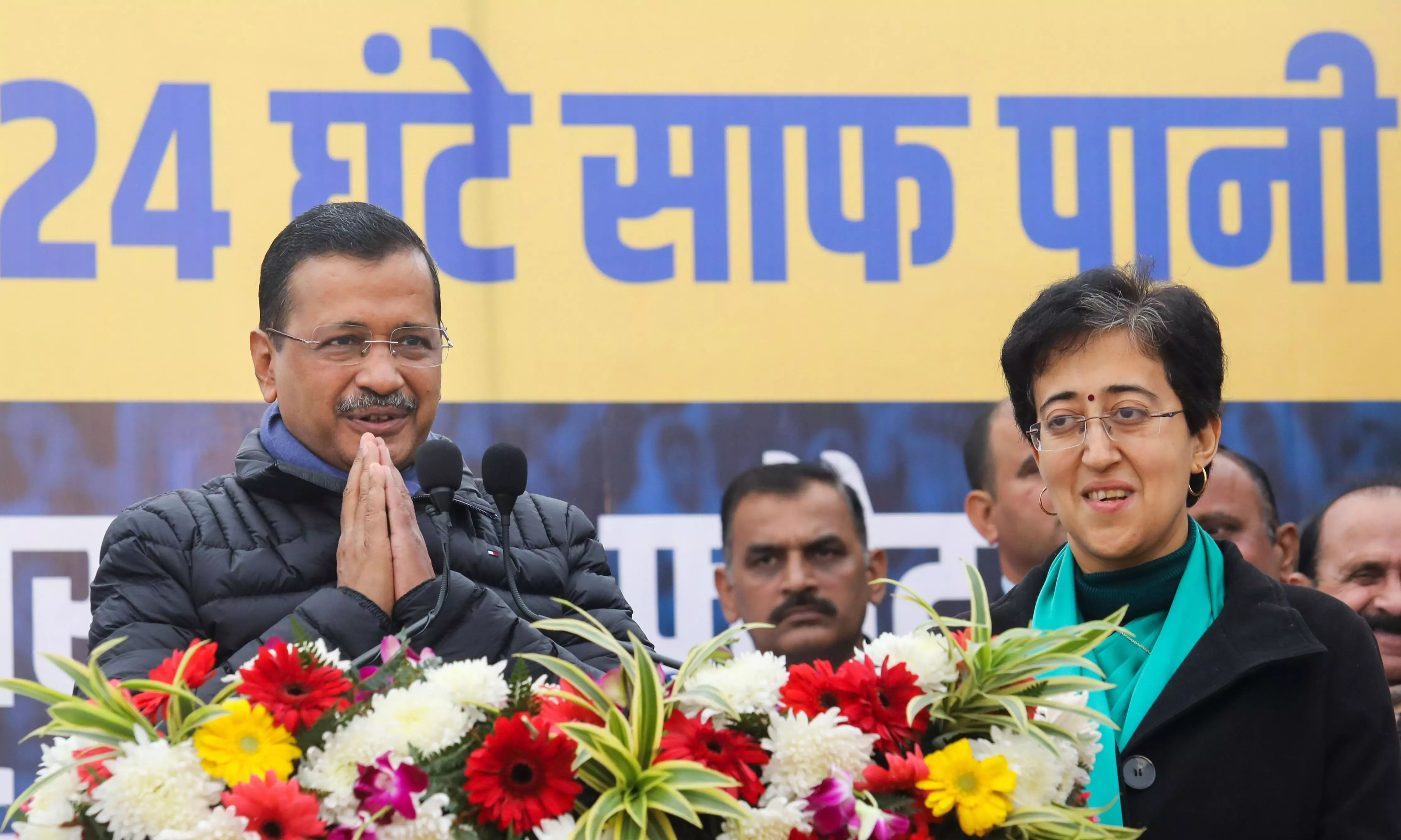
AAP leader Arvind Kejriwal's has come out with an election poster mocking Union home minister Amit Shah as a "chunavi Musalman" after the BJP accused Kejriwal of being a "chunavi Hindu". File photo
Kejriwal's scheme for priests: Populist gimmick or political strategy?
While the BJP accuses him of being a “Chunavi Hindu” (election-time Hindu), Kejriwal counters by questioning lack of similar schemes in the BJP-ruled states

AAP chief Arvind Kejriwal’s announcement of the Pujari Granthi Samman Yojana, offering an honorarium of ₹18,000 per month to Hindu priests and Sikh granthis, has sparked a political debate. While the BJP accuses him of being a “Chunavi Hindu” (election-time Hindu), Kejriwal counters by questioning the lack of similar schemes in the BJP-ruled states. Is this a desperate attempt to garner Hindu votes, or does it signify a deeper electoral strategy amidst Delhi’s financial challenges?
Pujari Granthi Samman Yojana: What It offers
The scheme, announced by Kejriwal, proposes an honorarium of ₹18,000 per month for temple priests and Sikh granthis in Delhi. Registration for the scheme began with Kejriwal personally enrolling priests from a temple near Kashmiri Gate. The initiative seeks to bring parity with the honorarium provided to Delhi's imams under the Waqf Board.
Also read: Delhi polls | AAP will give temple, gurdwara priests Rs 18,000 a month: Kejriwal
BJP calls out the timing
The BJP labeled Kejriwal a “Chunavi Hindu,” questioning the scheme’s timing before elections. BJP leaders argue that Kejriwal's outreach to religious communities, especially Hindus and Sikhs, is merely a populist ploy. Posters circulated by the BJP accuse Kejriwal of practicing "anti-Hindu politics" while using religion as a political tool.
Unpaid salaries and fiscal woes
Critics highlight the Delhi government’s financial strain. Despite promises of parity, the Delhi government has failed to pay salaries to imams under the Waqf Board for 17 months. Delhi’s revenue surplus has sharply declined — from ₹14,000 crore in 2022-23 to just over ₹3,000 crore in 2023-24 — and the state risks slipping into revenue deficit for the first time since 1993.
Senior journalist Puneet Nicholas Yadav observed, “Kejriwal’s government faces a debt of ₹5,000 crore, yet continues announcing new schemes. The financial burden of ₹18,000 per priest adds to an already overstretched budget.”
Parallels with Bengal politics
The scheme mirrors similar moves in West Bengal, where Chief Minister Mamata Banerjee faced criticism for balancing policies for imams and Hindu priests. Political commentator TK Rajalakshmi noted, “This act of religious appeasement is not new. Kejriwal might be trying to replicate Bengal’s strategy to woo a diverse electorate.”
AAP's strategy or desperation?
Rajalakshmi also pointed out the Sikh vote’s importance in Delhi, with the community influencing nearly 10 assembly seats. Kejriwal’s announcement could be a calculated move to preempt BJP’s potential appeal to religious communities. However, critics call it an act of desperation amid declining political momentum and allegations of corruption.
Populism vs governance: Will It work?
Kejriwal’s first term earned praise for reforms in education and healthcare. However, the governance in recent times has been overshadowed by corruption scandals, arrest of senior leaders, and shrinking budgets for health and urban development. Yadav remarked, “This scheme may win votes, but fulfilling these promises post-election is a different challenge given Delhi’s fiscal constraints.”
Also read: Mahila Samman Yojana: Kejriwal slams LG probe, says BJP fears defeat
BJP's insecurity over Hindu vote bank
While BJP leaders ridicule Kejriwal’s temple visits and religious outreach, analysts believe the party feels threatened. As Yadav said, “The BJP claims proprietorship over Hindu nationalism. When Kejriwal enters this space, they see it as encroachment.”
Battle for Delhi intensifies
With elections looming, Kejriwal’s Pujari Granthi Samman Yojana has stirred the political pot. Whether it’s a genuine attempt at inclusivity or merely an election gimmick, one thing is clear — the race for Delhi’s political mandate is heating up.
(The content above has been generated using a fine-tuned AI model. To ensure accuracy, quality, and editorial integrity, we employ a Human-In-The-Loop (HITL) process. While AI assists in creating the initial draft, our experienced editorial team carefully reviews, edits, and refines the content before publication. At The Federal, we combine the efficiency of AI with the expertise of human editors to deliver reliable and insightful journalism.)

